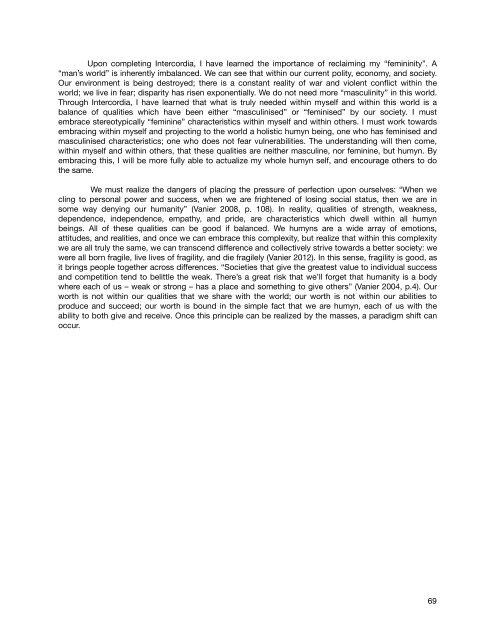Undercurrent-Issue-Fall-Winter-2014-3
Undercurrent-Issue-Fall-Winter-2014-3
Undercurrent-Issue-Fall-Winter-2014-3
Create successful ePaper yourself
Turn your PDF publications into a flip-book with our unique Google optimized e-Paper software.
Upon completing Intercordia, I have learned the importance of reclaiming my “femininity”. A“man’s world” is inherently imbalanced. We can see that within our current polity, economy, and society.Our environment is being destroyed; there is a constant reality of war and violent conflict within theworld; we live in fear; disparity has risen exponentially. We do not need more “masculinity” in this world.Through Intercordia, I have learned that what is truly needed within myself and within this world is abalance of qualities which have been either “masculinised” or “feminised” by our society. I mustembrace stereotypically “feminine” characteristics within myself and within others. I must work towardsembracing within myself and projecting to the world a holistic humyn being, one who has feminised andmasculinised characteristics; one who does not fear vulnerabilities. The understanding will then come,within myself and within others, that these qualities are neither masculine, nor feminine, but humyn. Byembracing this, I will be more fully able to actualize my whole humyn self, and encourage others to dothe same.We must realize the dangers of placing the pressure of perfection upon ourselves: “When wecling to personal power and success, when we are frightened of losing social status, then we are insome way denying our humanity” (Vanier 2008, p. 108). In reality, qualities of strength, weakness,dependence, independence, empathy, and pride, are characteristics which dwell within all humynbeings. All of these qualities can be good if balanced. We humyns are a wide array of emotions,attitudes, and realities, and once we can embrace this complexity, but realize that within this complexitywe are all truly the same, we can transcend difference and collectively strive towards a better society: wewere all born fragile, live lives of fragility, and die fragilely (Vanier 2012). In this sense, fragility is good, asit brings people together across differences. “Societies that give the greatest value to individual successand competition tend to belittle the weak. There’s a great risk that we’ll forget that humanity is a bodywhere each of us – weak or strong – has a place and something to give others” (Vanier 2004, p.4). Ourworth is not within our qualities that we share with the world; our worth is not within our abilities toproduce and succeed; our worth is bound in the simple fact that we are humyn, each of us with theability to both give and receive. Once this principle can be realized by the masses, a paradigm shift canoccur.69


